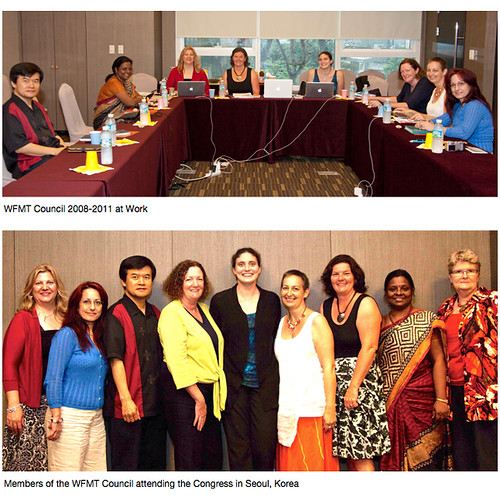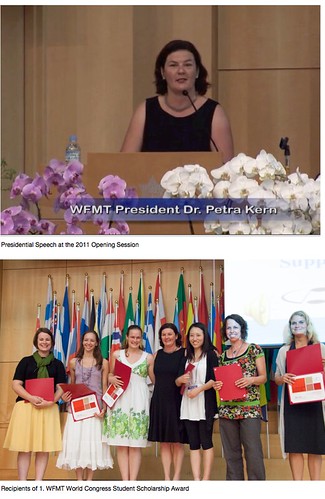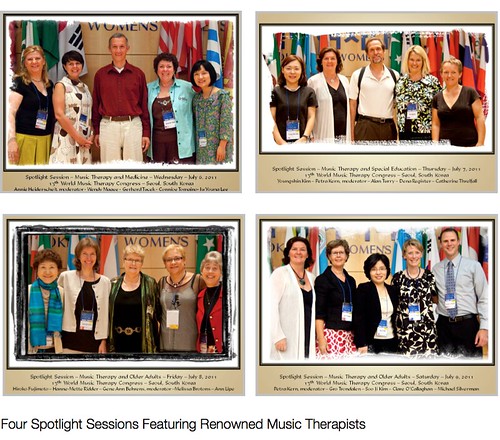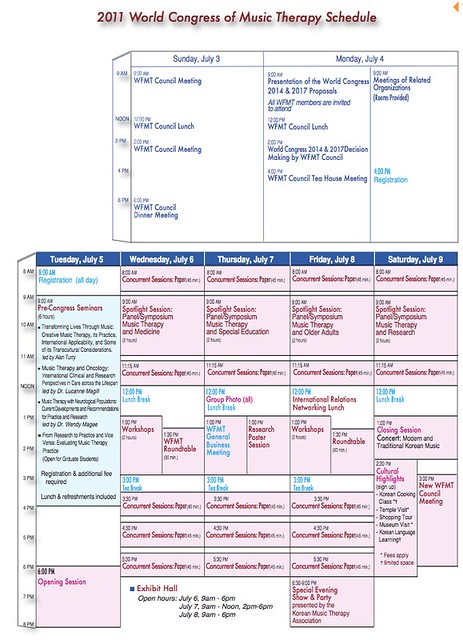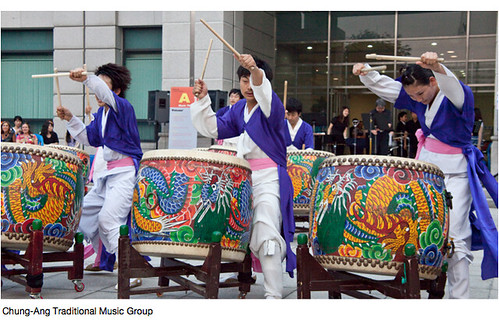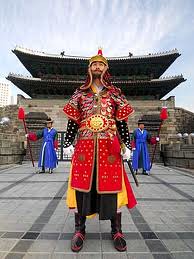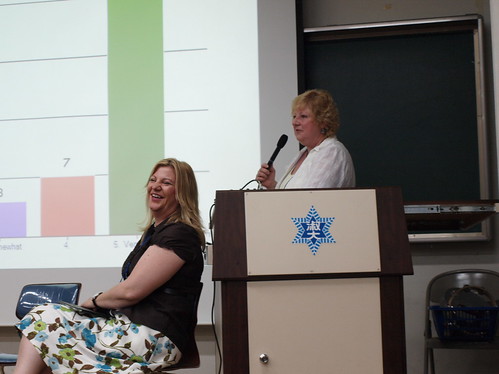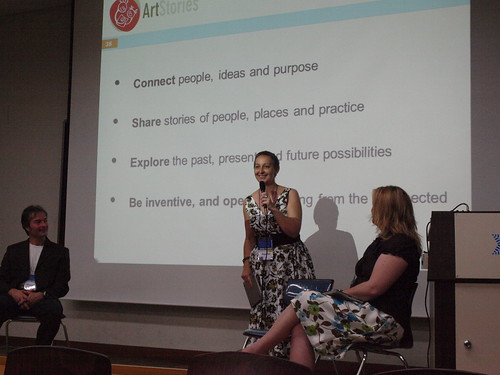[Original Voices: World Congresses of Music Therapy]
13th WFMT World Congress of Music Therapy: The Conference Organizers - An Interview with Byungchuel Choi, Petra Kern, Annie Heiderscheit Youngshin Kim & Kyungsuk Kim
By Seung-A Kim
Dr. Byungchuel Choi, Congress Chair, Professor, Sookmyung Women's University, Korea
My fellow music therapist, I am honoured to welcome you to Seoul, Korea for the 2011 World Congress of Music Therapy. The 13th World Congress is very special for all of us. Not only it is the first WFMT conference in Asia, but also features the first wide scale convergence of Eastern and Western Philosophy in the history of music therapy. All of the conference attendants are assured a comfortable stay in Seoul. Also, while you are here, you will be engaged with plenty of cultural engagements for your enjoyment.
Celebrate this congress with friends and colleagues from over 46 different countries. Let us all learn from one another and look forward to a stronger future in music therapy. I wish you a exciting journey in music therapy in dynamic Korea.
Greetings letter from the congress program.
An official video from the congress has been created by Dr. Byungchuel Choi, Congress Chair, 2011 World Congress of Music Therapy:
Dr. Petra Kern, WFMT Past President
Kim: What was special about the 13th WFMT World Congress of Music Therapy?
Kern: This was the first WFMT World Congress of Music Therapy held in Asia. Previous congresses took place in Europe, Latin America, North America, and Australia. With the growing number of music therapists in Asian countries as well as the many Asian students studying abroad, it was about time to learn about Eastern philosophies in music therapy and experience the rich music heritage and contemporary music of Asia. Modern music therapy is based on a global understanding of our profession. This congress gave us many opportunities to find out about cutting-edge research, training strategies, and latest clinical practices from Asian colleagues and around the world.
Kim: Who hosted the 13th WFMT World Congress of Music Therapy?
Kern: The Korean Music Therapy Association (KMTA), a full organizational member of WFMT, hosted the 13th World Congress of Music Therapy at the Sookmyung Women’s University in Seoul, South Korea. Dr. Byungchuel Choi, the President of KMTA assumed the Congress Organizer position on the WFMT Council. Additional members of the local organization committee were Dr. Jiyoung Moon, Carolyn Shim, Jungyoon Yeo, Dr. Kyungsuk Kim, and Dr, Youngshin Kim who chaired the Scientific Committee. Members of the Scientific Committee were:
- Dr. Byungchuel Choi (South Korea)
- Dr. Hyunjoo Chong (South Korea)
- Dr. Soo Ji Kim (South Korea)
- Dr. Anja Tait (Australia)
- Dr. Petra Kern (USA)
- Dr. Michael Silverman (USA)
- Dr. Amy Clements (Canada)
- Dr. Lia Rejane Mendes Barcellos (Brasil)
- Dr. Kana Okazaki-Sakaue (Japan)
- Dr. Hanne-Mette Ridder (Denmark)
- Dr. Sarah Hoskyns (New Zealand)
- Ms. Andeline Santos (South Africa)
- Dr. Gerhard Tucek (Austria), and
- Dr. Simon Procter (UK)
Kim: What was the topic of the congress and how many people attended?
Kern: The topic of the congress was Music Therapy in Eastern and Western Philosophy, reflecting similarities and differences in music therapy practice, research, and education in Eastern and Western culture. The congress hosted 1347 colleagues from 45 countries.
Kim: What did the congress schedule look like?
Kern: The congress started out with meetings of the WFMT Council followed by four pre-congress seminars (i.e., Transforming Lives Through Music – Dr. Alan Turry and colleagues; Music Therapy and Oncology – Dr. Magill and colleagues; Music Therapy with Neurological Populations – Dr. Wendy Magee and colleagues; From Research to Practice and Vice Versa – Ms. Rose Fienman and the WFMT Assembly of Student Delegates). The opening session was packed with inspiring speeches, an award ceremony (i.e., Lifetime Membership Award – Dr. David Aldridge; six WFMT Student Scholarship awards), a moment of remembrance, and a spectacular concert of traditional and contemporary Korean music and dances. The sounds, ancient instruments, gracious movements, colorful costumes, and overall performances were extraordinary and certainly new to our Western eyes and ears. The opening session ended with a standing ovation and a sense of curiosity and excitement for the days to come.
A new addition to the WFMT World Congress of Music Therapy in 2011 was the Spotlight Sessions. Each day of the congress, the WFMT Council featured a two-hour session on a key topic presented by a total of sixteen renowned music therapy experts whose expertise spanned generations and WFMT’s eight regions. No other presentations were scheduled during those times so that all congress attendees could join. For the Spotlight Sessions simultaneous translation into Korean, Japanese, and Chinese was provided. All speakers shared their knowledge, experiences, different perspectives and views on music therapy in Eastern and Western philosophies, which sparked great discussions among the congress attendees. Presentation slides of the four Spotlight Sessions can be accessed on the WFMT Education Center at http://www.wfmt.info/WFMT/Education_Center.html
Additionally, the congress program included 124 concurrent sessions, 32 workshops, 8 roundtables, 5 clinical forums, and 48 research posters from professionals residing in 32 countries. One can safely say that this congress offered something for everyone. For more details please access the Congress Proceedings at http://www.musictherapytoday.wfmt.info/Music_Therapy_Today/MTT__Special_Issue.html
Kim: Which cultural and social events were offered?
Kern: This congress truly brought the Korean culture to the event. Next to the grand opening night, the Special Show & Party presented by KMTA featured the Chung-Ang Traditional Music Group and the Modern Harmonica Ensemble, adjacent to Korean food. The outdoor drumming performance was intriguing and the ribbon dances fascinating. Storming applause, enthusiastic cheers, and hundreds of flashlights captured this memorable event. While enjoying a Korean food feast, congress attendees socialized with each other, met members of the WFMT Council, or made new lifelong professional connections. An atmosphere of friendliness, interest, and happiness was in the air, which was topped by enjoyable fireworks at the end of the night.
Additionally, many flavorful lunches offering networking opportunities, a massive group photo shoot capturing over 1000 people, and a touching closing ceremony enriched our cultural understanding and gave us new international perspectives. After the congress, colleagues could choose to deepen their cultural experiences by signing up for four different city tours visiting remarkable sites such as the Gyeomgbokgung Palace, the Jogyesa Temple, Insa-Dong, and the National Museum of Korea. Alternatively, attendees could take a Korean language or cooking class offered by the Sookymung Women’s’ University. P.S. – While I was attending one more WFMT Council meeting, my husband learned how to make Kimchi. Later on, I heard from a Japanese colleague that he was doing rather well. No doubt, he knows how to cook!
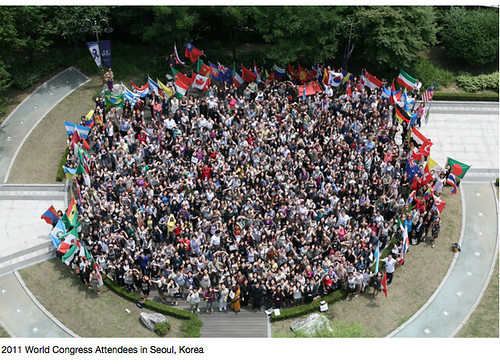
Kim: What were your personal highlights of the 13th World Congress of Music Therapy?
Kern: This World Congress was special to me in many ways. Serving as the WFMT President, I had the honor of welcoming hundreds of music therapists at the opening session and the opportunity to meet and speak in person with several leaders, researchers, educators, and practitioners from various countries. I was touched by the numerous success stories told about the benefits of music therapy for individuals of all ages and nations, inspired by the enthusiasm and positive attitude of our WFMT Assembly of Student Delegates and various young professionals, and grateful for having an esteemed team of colleagues working with me on the WFMT Council. Overall, I enjoyed the generous hospitality, the collegial atmosphere, the honest interest in each other’s work, the cultural exchange, and the passion for music therapy that we all share.
On a personal note, the traditional teahouse visits were heavenly, the Korean Spa treatment extraordinary, shopping for handcrafted paper and scarves joyful, visiting art galleries blissful, and a Buddhist temple stay insightful. Thanks to all Korean colleagues and friends for making this World Congress and visit unforgettable.
Annie Heiderscheit, Ph.D., MT-BC, LMFT; Interim President, World Federation of Music Therapy
What I remember about the 2011 World Congress
What I remember most about the 2011 World Congress in Seoul, Korea were the 1,347 music therapists hailing from 46 countries. It was a wonderful time to experience such an international gathering and to be able to meet with old friends and develop new relationships with colleagues. I enjoyed presenting with my international colleagues and learning from them as well. I always find these opportunities to dialogue and to exchange information and ideas fruitful and exhilarating. These always spark new presentations, projects and collaborations.
I also enjoyed the 4 spotlight sessions, the numerous concurrent sessions, workshops, roundtables, and clinical forums. Each morning the spotlight sessions were filled to capacity. It was overwhelming to stand on the stage and look out at the sea of people filling the room. I remember seeing many familiar faces and many new faces, each there to take in information and learn. It was thrilling to witness renowned, experienced and young colleagues alike engaged with one another and sharing their latest research findings and clinical developments. I relished in seeing and being in rooms filled with colleagues from all around the world as we listened and learned from each other. It was interesting to discover the similarities and differences in our practices from one country to another and how we come together to advance our profession internationally.
I was impressed and dazzled by the beauty of the cultural events, with each event more stunning than the next. The performances were filled with colorful Korean traditional dress, instrumentation and song. The unique music and sounds were a wonderful gift we were able to savor each day. The traditional Korean food that was so generously served to us in such abundance added a unique gastronomic experience to the congress as well.
It was the combination of all these different aspects and elements of this world congress that made it a memorable event. I talked with so many music therapists who heard that this was the first world congress they had ever attended. They each shared their excitement in traveling to Asia and being able to be a part of such a spectacular event. I heard time and time again that this was a once in a lifetime experience. This is a remarkable experience… taking part in an international event, learning from colleagues from around the world AND having a once in a lifetime experience.
I reflect on these moments each time I recall the 13th World Congress. It was an honor and a privilege to be involved with planning the event. I am incredibly grateful to my Korean colleagues for organizing and hosting such a spectacular event. If there is one defining moment of this event it is in the photograph where we all gathered. In this large circle you grasp the depth of the profession as we gathered from around the world. If you haven’t seen this photo, be sure to visit the World Federation of Music Therapy website at www.wfmt.info and be amazed.
Youngshin Kim, PhD, MT-BC, NRMT, SookMyung Women’s University; Chair, International Scientific Committee 2011 WFMT World Congress of Music Therapy
It is my great pleasure to welcome you to the 13th World Congress of Music Therapy of the World Federation of Music Therapy: "Music Therapy in Eastern and Western Philosophy". As its topic suggests, the conference pays special attention to similarities and differences in music therapy between East and West. The call for papers for the 13th World Congress of Music Therapy attracted 339 submissions on a wide variety of topics. The 2011 WFMT World Congress of Music Therapy International Scientific Committee accepted 124 research papers, 32 workshops, 8 roundtables, 5 clinical forums, and 48 posters from 32 countries of the world to be presented at the congress. Each submitted paper was reviewed by at least two members of the International Scientific Committee. Among the 217 accepted proposals, 96 authors made their contributions to the congress proceedings. The conference covers a wide range of topics like:
- multicultural issues in music therapy;
- supervision and training of music therapists;
- music therapy clinical practices;
- music therapy assessment;
- music therapy research; and
- music technology.
- Music and Medicine,
- Music Therapy and Special Education,
- Music and Gerontology, and
- Music Therapy Research.
I would particularly like to thank every author who submitted a paper to the congress; the International Scientific Committee, additional reviewers and proofreaders who carefully considered them. I hope all of you enjoy attending the congress and meeting and interacting with the speakers and participants from all around world!
Dr. Kyungsuk Kim, Chair, Registration; Hansei University, Korea
Seung-A Kim: How many people attended and from how many countries?
Kyungsuk Kim: For the 2011 World Congress of Music Therapy in Korea, I was in charge of registration for both native and foreign participants. Since registration opened in Summer 2010, a total of 1309 people participated in the congress from 42 countries despite the fact that some of the registered people couldn’t join the congress due to visa complications or personal reasons (See Table 1).
Antigua and Barbuda |
India |
Portugal |
Argentina |
Indonesia |
Qatar |
Australia |
Ireland |
Russia |
Austria |
Israel |
Singapore |
Brazil |
Italy |
South Africa |
Canada |
Japan |
Spain |
Chile |
Korea |
Sweden |
China |
Lithuania |
Switzerland |
Czech republic |
Malaysia |
Taiwan |
Denmark |
Netherlands |
Thailand |
Finland |
New Zealand |
UK |
France |
Norway |
United Arab Emirates |
Germany |
Philippines |
USA |
Greece |
Poland |
Venezuela |
Among them, 521 registrants including 391 professionals and 130 students participated from outside of Korea, while 361 professionals and 427 students were registered from Korea. The greatest number of registrations outside of Korea came from Japan with 151 people, then China and the US with 99 and 81 participants, respectively.
Seung-A Kim: What were some of the highlights for you - in terms of the formal congress content and personally?
Kyungsuk Kim: During the congress, we had a lot of interesting sessions and cultural events that were provided by professional instructors and performance teams from around the world. Participants from other countries especially favored traditional Korean music and dance, and the firework ceremony held at night confirmed that this truly was an international event.
I can still remember a moment during the closing session. We planned the finale of the conference to be a chorus of both the participants and a choir composed of handicapped children. Michael Jackson’s “Heal the World” was the song planned for the evening, as we thought it was a fitting song for music therapists. At the time, I was on the stage with other committee members, and as the song’s lyrics lit up the screen and the choir started to sing, all the participants showed deeply moved expressions on their faces. As the song progressed, most began to cry, or sing even louder. Even after the song was finished, no one was able to leave the room because they were all crying, hugging each other, and sharing the moment. That experience was enough to outweigh all of the stress and frustration of planning the conference into a fruitful endeavor.

